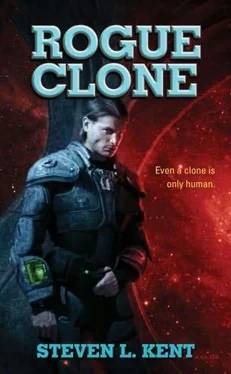Steven Kent - Rogue Clone
Здесь есть возможность читать онлайн «Steven Kent - Rogue Clone» весь текст электронной книги совершенно бесплатно (целиком полную версию без сокращений). В некоторых случаях можно слушать аудио, скачать через торрент в формате fb2 и присутствует краткое содержание. Жанр: Боевая фантастика, на английском языке. Описание произведения, (предисловие) а так же отзывы посетителей доступны на портале библиотеки ЛибКат.
- Название:Rogue Clone
- Автор:
- Жанр:
- Год:неизвестен
- ISBN:нет данных
- Рейтинг книги:3 / 5. Голосов: 1
-
Избранное:Добавить в избранное
- Отзывы:
-
Ваша оценка:
- 60
- 1
- 2
- 3
- 4
- 5
Rogue Clone: краткое содержание, описание и аннотация
Предлагаем к чтению аннотацию, описание, краткое содержание или предисловие (зависит от того, что написал сам автор книги «Rogue Clone»). Если вы не нашли необходимую информацию о книге — напишите в комментариях, мы постараемся отыскать её.
Rogue Clone — читать онлайн бесплатно полную книгу (весь текст) целиком
Ниже представлен текст книги, разбитый по страницам. Система сохранения места последней прочитанной страницы, позволяет с удобством читать онлайн бесплатно книгу «Rogue Clone», без необходимости каждый раз заново искать на чём Вы остановились. Поставьте закладку, и сможете в любой момент перейти на страницу, на которой закончили чтение.
Интервал:
Закладка:
“What do you suggest I do with him?” I asked.
“Sit him up,” the colonel said.
“I don’t think he’s worried about appearances,” I said. I waited for the colonel to move out of my way so that I could leave the cabin. I don’t think I felt anger yet, though I knew that emotion would come. At the moment, I simply felt numb.
“Let the dead bury the dead,” I whispered to myself as I left the room. I was a Liberator. I was Klyber’s brew. We had not been built to mourn the dead, we were programmed to avenge them.
“What do we have here?” I heard a cheery voice through the open doorway of the engine compartment as I walked down the hall. The cabin that housed the broadcast equipment was nearly twice the size of Klyber’s small cabin. I peered in the door and saw two demolition men in black armor kneeling side by side in front of the broadcast engine.
The broadcast engine looked like a giant replica of a box of rifle shells. The engine casing was a rectangular black box with chrome stripes. Inside the case stood eighteen brass cylinders that looked like three-foot-tall replicas of long-point bullets. A network of wires and tubes connected these cylinders.
“Was it sabotage?” I asked.
The two men turned back to look at me. I could see their faces through the glass in their protective masks. “So much for mystery,” one of the men said, holding up a foot-long length of perfectly clean copper cable. “I could have told them what happened the moment the ship went dark.”
I felt a hand grasp my shoulder. “You okay, there, Harris?” the colonel asked.
“That cable?” I asked.
“Oh, hello, Colonel McAvoy,” the second bomb squadder said.
“Boys,” said the colonel. “You were about to explain something to the lieutenant?”
“This is what happens when a broadcast goes wrong,” the first guy said. “And there are too many things that can go wrong. No one in their right mind ever travels in a self-broadcasting ship.”
I, of course, had traveled to the Golan Dry Docks in a self-broadcasting ship. The impact of the technicians’ statement had just begun to sink in when I heard, “And that, Lieutenant Harris, is how you allowed the deaths of every one on this transport.” I turned to see the chief of emergency services glaring down at me.
“Easy, Fred,” warned the colonel.
“If you came here to protect the admiral, you did a shitty job. This ship was sabotaged right under your specking nose, bud.” He stepped past me and took the copper cable from the bomb squad technician. Brandishing it like a newspaper at a misbehaving dog, he added, “Do you know how these people died?”
“I heard something about cardiac arrest,” I said.
“Cardiac malfunction caused by electrocution would be more accurate. Somebody strung a cable from inside the broadcast engine to the frame of the ship. When the pilot turned on the broadcast engine, he sent four million volts through the entire ship for one one-hundredth of a second.”
“One one-hundredth of a second …” I echoed.
“Do you understand how broadcasting works?” the tech asked. “The engine generates …”
“Yes,” I said. “I know how broadcasting works.” From what I had heard, only a select few in the entire galaxy truly understood the principles that made the broadcast process work, and they were elite scientists. I doubted some lowly corpse bagger understood the theory of broadcast travel any better than I did. I knew that broadcast engines coated ships with highly-charged particles that could be translated and transferred instantaneously, and that was enough for me.
“Yeah, well, apparently other people know how it works, too,” said Fred, the Golan Dry Docks emergency services czar. “’Cause somebody snuck on to this ship under your nose and planted this cable. The admiral died on your watch, asshole.”
CHAPTER FOURTEEN
I did not return to the Doctrinaire . I boarded the Johnston Starliner that Klyber loaned me for my trip to the Golan Dry Docks, and I charted a course into space. I flew straight out into deep space, away from the Dry Docks and the broadcast network, for four hours. This far out, the blackness seemed to fold in on itself like a blanket closing around me. By that time I had flown millions of miles to nowhere. A more experienced pilot might have understood the navigational hazards of deep space travel, but I neither understood nor cared. And, of course, I had a self-broadcasting ship.
Before initiating the broadcast engine, I climbed out of the cockpit and squeezed down the aisle through the cabin. The Johnston R-56 Starliner was a luxury craft. It did not have a living room-like main cabin, but it had enough headroom for me to walk nearly erect. It was designed to carry twenty passengers in six rows, but the last two rows of this particular craft were blocked off by a felt-covered bulkhead. Behind that bulkhead sat the broadcast engine.
I had pulled the power cables from the broadcast engine before approaching Golan. Without juice running through it, the broadcast engine was nothing more than a mess of brass, silicon, copper, and cables—undetectable with remote surveillance equipment. Now, before reconnecting those cables, I thought about what happened to Klyber’s transport and gave the broadcast equipment a quick diagnostic.
I shimmied around to the back of the engine and checked for cables. Everything looked fine. I inspected the far corners, looking between the engine and the inner wall of the fuselage. Nothing. Moving on to the special generator that powered the engine, I removed a few of the cylinders and inspected the floor using a mirror to peer around corners. The floor looked clean.
Taking a deep breath, I stretched the power cables to the proper terminals on the broadcast engine and snapped them into place. I closed the hood over the engine and returned to my seat in the cockpit. And there I sat.
I thought about the dangers of self-broadcasting. A competent assassin could certainly have hidden a grounding cable somewhere in my ship where I would not find it.
As I thought about it, Klyber and his crew could scarcely have found a better way to go. All they knew was that their ship had traveled a safe distance from the Dry Docks and then they were dead. A powerful charge ran through them for one one-hundredth of a second. It stopped their hearts, turned some of their skin and hair to dust, and went away.
Even the officer who happened to have his hand on a door handle died painlessly. The metal handle prolonged the charge into his already-dead body and he charred. Had “Major Burns’s” ghost hung around, it would have had reason to cringe; but “Burns” himself felt nothing.
When I first heard the med techs referring to him as “Major Burns,” I thought it was yet another example of morbid med tech humor. Ironically enough, his real name was Major James T. Burns.
My thoughts returned to Bryce Klyber—my last tie to the Unified Authority, my former commander, and ultimately my creator, since he had led the team that engineered the Liberators. A creator was a cold and unattainable relation. I told myself that if I had once loved Klyber, it was only in the way that a man lost in a tunnel loves the light when he finds a way out. Klyber was kind to me. He protected me. In the end, though, he saw me as a way of justifying his career. I was not a son to him, not even a colleague.
Admiral Klyber wanted to use me to clear his name. History remembered Liberator clones as brutal and uncontrollable killers. Klyber’s agenda was simple. He wanted to remind the people that his Liberators had saved the Republic. I wasn’t a person to Bryce Klyber, I was a means to an end. Perhaps that was all any person was to another—a means to an end. Certainly the synthetic population was a means for helping natural-borns achieve certain ends.
Читать дальшеИнтервал:
Закладка:
Похожие книги на «Rogue Clone»
Представляем Вашему вниманию похожие книги на «Rogue Clone» списком для выбора. Мы отобрали схожую по названию и смыслу литературу в надежде предоставить читателям больше вариантов отыскать новые, интересные, ещё непрочитанные произведения.
Обсуждение, отзывы о книге «Rogue Clone» и просто собственные мнения читателей. Оставьте ваши комментарии, напишите, что Вы думаете о произведении, его смысле или главных героях. Укажите что конкретно понравилось, а что нет, и почему Вы так считаете.












